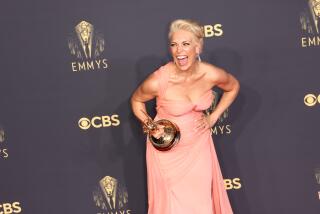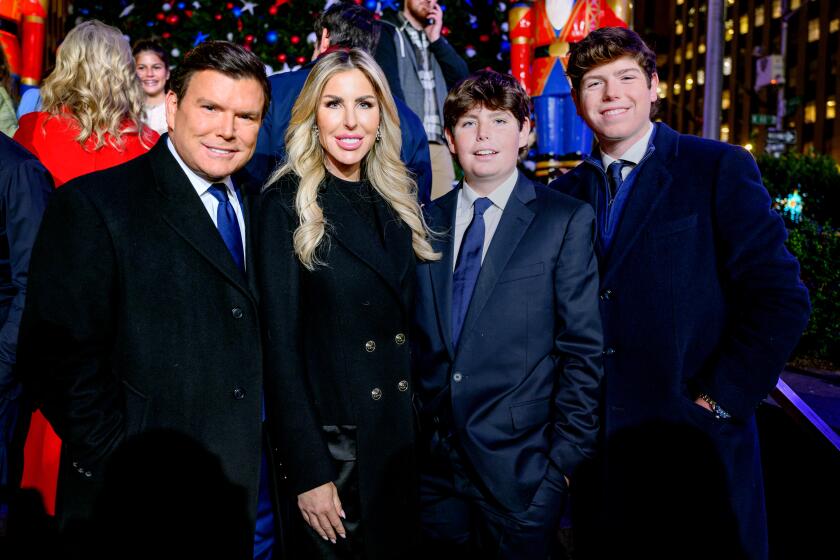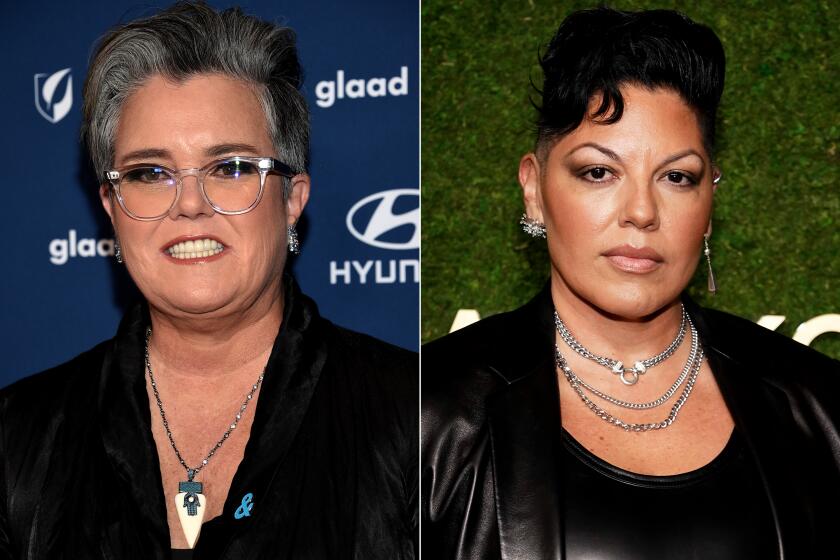‘Downton Abbey’ recap: Mary moves on without Matthew
Don’t let those somber new opening credits fool you: “Downton Abbey” is back and, despite a veneer of sadness hanging over the place, not much has changed.
Indeed, there is so much familiar in Sunday’s Season 4 premiere of “Downton Abbey” -- a conniving lady’s maid, a patronizing, pompous Lord Grantham and yet another magical last-minute inheritance -- that Cousin Matthew’s absence is, dare I say it, not all that noticeable. (The lack of canine rear-end in the opening sequence, on the other hand, is egregious.)
That’s not to say that we don’t miss our favorite dreamy-eyed accidental millionaire, only that as much as things change on this show, they also stay the same -- maddeningly, if entertainingly, the same.
PHOTOS: The ‘Downton Abbey’ cast without costumes
As the episode begins, it’s 1922, six months after Matthew went careening off a country lane to his untimely death. Mary is deep in a state of mourning -- beautiful, glamorous, magnificent mourning. It’s an ice queen version of Lady Mary we haven’t seen in a while, if ever. Even back in her bitter single-girl days, Mary was more haughty than heartbroken, but now her frostiness is heightened by a real sense of loss. Not to be insensitive, but she looks pretty great being miserable, in a wan, waif-model way, staring vacantly out the window and sulking around Downton in her fabulous black frocks.
But all her wallowing is getting tiresome for everyone around her, and it’s also not great for baby George (though I’d imagine even grief-stricken Mary isn’t much more aloof than your average aristocratic mother circa 1922). Branson, who knows a thing or two about losing a spouse hours after becoming a parent, thinks it’s time to get Mary involved in the management of the estate -- not only to prevent her from sinking into a depressive abyss, but also, I suspect, to keep Grantham from squandering Matthew’s fortune all over again. He even enlists Carson in his plan, saying that Grantham sees Mary as “a little woman who shouldn’t be troubled by anything so harsh as reality”; the Marxist chauffeur may have abandoned his radical politics, but in the meantime he’s also blossomed into something of a feminist.
Branson’s plan initially backfires -- is there anything more devastating than when Mary is mean to dear old Carson? -- but our heroine slowly comes around, thanks in part to a “chin up” speech from Violet who, in the immortal words of George Michael’s T-shirt, urges her to “choose life.” A tearful Mary promptly apologizes to Carson, and shows up the next morning at the tenants’ luncheon, looking lovely in a dusty lavender dress. “What’s all this I hear about your giving up sheep?” she asks attentively.
VIDEO: Interviews with the women of ‘Downton Abbey’
I for one am pleased at the prospect of Mary as a gentlewoman farmer, making the rounds with Branson to check in on “the crops and...the live.. the livestock,” as Violet so memorably pust it. Mary may be posh, but as we know from her fox-hunting days, she’s also not afraid to get a little dirty. And while she may not be as vocally feminist as either of her sisters, Mary certainly has the inherent moxie to be a trailblazer.
Virtually unchanged is Lord Grantham, who’s the same patronizing, pompous mansplainer he has always been. He insists that Mary be allowed to wallow indefinitely, apparently mistaking his feisty daughter for a delicate flower. Then, when Matthew’s Magical Letter from Beyond the Grave appears, he doesn’t want to let her read it before he’s had Murray review it. Finally, he shames her in front of the whole entire family for not immediately having an opinion about some minute aspect of the estate’s management -- this from the guy who blew his wife’s entire fortune on a single bad railroad investment. As Vulture put it this week, virtually everything that goes wrong on “Downton Abbey” is Grantham’s fault; what I can’t tell is if Julian Fellowes wants us to think he’s an idiot, or simply overprotective.
Or maybe it’s just that wisdom skips a generation in the Crawley family? Because once again Cora proves to be as bad at managing personnel as her husband is with finances. No sooner is O’Brien out the door -- a moment of silence please -- than another, even more obviously treacherous lady’s maid has arrived at Downton Abbey.
And not just any maid, either, but Edna Braithwaite, a.k.a. the woman who tried to put the moves on Branson last season, and who’s already been sent packing once by Mrs. Hughes. Granted, Cora doesn’t know the whole story -- that Mrs. Hughes only wrote a good recommendation in order to protect Branson -- but there are warning signs all over the place, starting with Braithwaite’s shifty-eyed demeanor and flimsy “my aunt was sick” excuses. And why on Earth would Cora believe Thomas, who may be known as “Barrow” now because of his promotion but who’s as slippery as ever, over Anna, a trusted member of staff for 10 years? I ask in all honesty, has there ever been a worse judge of character than this woman?
WINTER TV PREVIEW: Full coverage of the season’s shows
Well, maybe: One of the most vexing things about Cora is that she’s just so inconsistent when it comes to the staff. She hires and essentially promotes Braithwaite, despite Mrs. Hughes’ objections, and practically in the same breath fires Nanny West without so much as blinking. How can someone so decisive be such a pushover?
Whatever the case may be, I’m excited about the possibility created by Nanny West’s departure. While I’d like to see Thomas installed as Downton’s new Manny (and I think he would, too) that seems unlikely. I have a sneaking suspicion that the new nanny, whoever she might be, could be a love interest for a member of the house -- maybe someone who, like her, is neither one of the servants nor really one of the family? Hmmm… if only I could think of someone who fit that description.
As familiar as Thomas’ scheming and Cora and Grantham’s poor decision-making may be, the “Downton Abbey” deja vu is most acute when a mysterious box arrives containing a letter from Matthew. Yet again, Fellowes writes his way out of an inheritance issue with a piece of paper that materializes out of thin air -- after doing so twice last season alone (first with Mr. Swire’s will, then with Lavinia’s deathbed letter conveniently absolving Matthew of guilt).
In a letter he written just before he left for Scotland, Matthew expresses his wish to leave his estate to Mary, and not to baby George as English law would have otherwise dictated. Obviously, Fellowes has done this to set Mary up as a desirable (read: wealthy) heiress once she’s back on the marriage market, and that’s a fair enough goal. But sometimes watching Fellowes working himself out of narrative corners reminds me of when Jerry would paint a door on the wall in order to escape Tom in those old “Tom & Jerry” cartoons.
BEST TV OF 2013 Lloyd | McNamara
But there are some other changes afoot: After three seasons as “the Jan Brady of post-Edwardian Yorkshire” (to steal a phrase from my colleague Yvonne Villarreal), Lady Edith looks poised to take her long-overdue turn as the Sassy Crawley Sister. She certainly has the wardrobe for it. (That green embellished strapless number -- yowzah!).
Alas, things are never easy for Edith, and her latest romance is no exception. She’s now completely head-over-heels for her married editor boyfriend, Michael Gregson, who takes her to fancy literary parties (hey, look, it’s Virginia Woolf!), dines with her in public and even makes her coffee. How very modern!
For now at least, the relationship is doing wonders for Edith, who is more confident and content than she’s ever been. This being Edith, however, there are some ominous clouds on the horizon -- huge, black, billowing ones. We learn that the only way Michael will be able to divorce his mentally ill wife is if he moves to Germany and becomes a citizen. Needless to say, Edith’s “nearly German and nearly divorced” boyfriend is unlikely to go over well with the folks back at home, where traumatic memories of the war remain fresh in everyone’s minds. It’s also 1922 and, well, let’s just say Michael may live to regret his decision to move to Germany in a few years’ time.
Rivaling Edith in her recklessness is Cousin Rose who, like a certain other posh beauty named Rose, spends a wild night out dancing with the proles and has to concoct a story about being engaged to a local farmer in order to ward off the attentions of Sam, a very young gent who looks like he might be Billy Elliot’s great-grandfather. Fingers crossed for some more transgressive romance this season.
Below stairs, things hardly seem to have changed at all: Daisy is still unlucky in love, the Alfred-Jimmy-Ivy love triangle is still boring, Mrs. Patmore is still afraid of being made redundant by technology, poor Mr. Molesley still can’t seem to catch a break and Hughes and Carson still have the most adorable platonic romance on television. While there is certainly comfort in the familiar, especially when it comes to “Downton Abbey,” in the season ahead let’s hope Fellowes figures out a way to shake things up rather than simply reheating leftovers.
ALSO:
Edith comes into her own on ‘Downton Abbey’
Review: Matthew’s life may inject some life into ‘Downton Abbey’
‘Downton Abbey’ writer Julian Fellowes carries on without Matthew
Twitter: @MeredithBlake
More to Read
The complete guide to home viewing
Get Screen Gab for everything about the TV shows and streaming movies everyone’s talking about.
You may occasionally receive promotional content from the Los Angeles Times.






